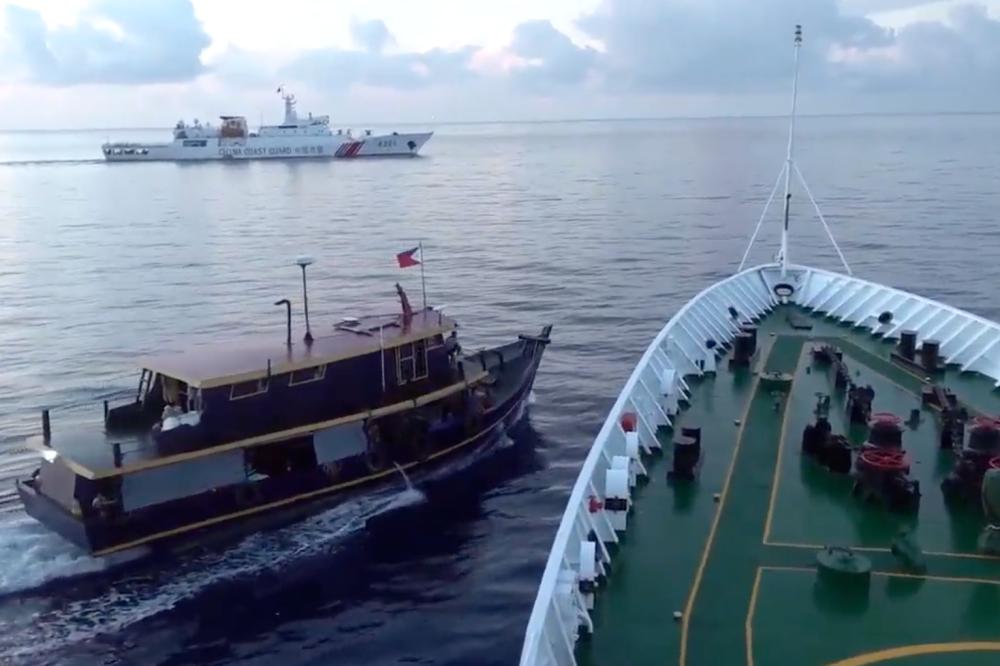
THE Chinese Coast Guard has confirmed that their vessel and a Filipino civilian resupply vessel had a brief collision a few nautical miles away from the Ayungin Shoal in the West Philippine Sea on Sunday.
However, the Chinese Coast Guard claimed it is the Philippine vessel Unaizah Mae 2 which “deliberately” turned its rear towards the front of the Chinese boat, which resulted in the collision.
Gan Yu, spokesman of China Coast Guard, said the incident started when Philippine vessels “trespassed without permission” into the waters near Ayungin Shoal (or what it calls Ren’ai Reef on Sunday, October 22.
“Since the Philippine side ignored China’s repeated warnings, the China Coast Guard responded lawfully and blocked the Philippine vessels which were illegally carrying construction materials,” Yu said in a statement.
He stressed that the Coast Guard was “lawfully conducting law enforcement activities” when the Philippine resupply boat allegedly “sailed at the bow (front side)” of China Coast Guard 5203 “on purpose.”
The move, he claimed, was “not professional nor safe in spite of China’s advanced notice and repeated warnings.”
“At 0813 AM, the Philippine vessel 4409 began to astern deliberately, leading to collision of the stern (rear) of its vessel into the starboard (right) of China’s static floating Qiong Sansha Yu 00003,” Yu said.
The Chinese Embassy in Manila released two videos of the Chinese Coast Guard to prove their narrative. One video is a bird’s eye view, probably taken from a drone, and then the other appears taken from their Coast Guard vessel.Gu accused the Philippine vessel of provoking the Sunday collision “to make faults with China and escalate the current situation.”
“The Philippines’ action seriously violated the International Regulations for Preventing Collisions at Sea and threatened the navigation safety of the Chinese vessels.The operation of the Chinese side was professional, legitimate and lawful and the responsibility lay entirely with the Philippine side,” he added.
International reaction
Ambassadors of the United States, Canada, Australia, Japan, Germany, The Netherlands, and the European Union immediately reacted to the incident.
The US and Canada issued very strongly-worded statements condemning the Chinese Coast Guard and maritime militia vessels for the incident.
“The United States condemns PRC’s latest disruption of a legal Philippine resupply mission to Ayungin Shoal, putting the lives of Filipino service members at risk. We stand with our #FriendsPartnersAllies in protecting Philippine sovereignty and in support of a #FreeAndOpenIndoPacific,” US Ambassador MaryKay Carlson tweeted.
Canadian Ambassador David Hartman said China’s actions “are unjustified,”
“China has no lawful claim to the West Philippine Sea. Its actions are incompatible with the obligations of a signatory to the UN Convention on the Law of the Sea,” Hartman said in a statement.
“Continuing acts of intimidation and coercion undermine safety, stability, and security across the region, and increase the risk of miscalculation,” he added.
Japanese Ambassador Koshikawa Kazuhiko said he is “seriously concerned and alarmed” over the collision incident.
EU Ambassador Ambassador Luc Veron called “these incidents, their repetition and intensification” as “dangerous and very disturbing.”
Meanwhile, two European ambassadors also made separate statements related to this incident — German Ambassador Andreas Pfaffernoschke said Germany is “very concerned” while Dutch Ambassador Marielle Geraedts calls the collision as “another worrying incident.”
“Australia is concerned by China’s dangerous maneuvers that damaged Philippine vessels and disrupted a Philippine resupply mission in the EEZ (exclusive economic zone),” Australian Ambassador HK Yu PSM tweeted.
The Dutch and Canadian ambassadors said they were glad nobody got hurt. The Canadian envoy further commended the “professionalism and restraint exercised by the Philippine Coast Guard.”
Germany, The Netherlands, EU, Australia, and Canada supported the Philippines on the need for all parties to abide by international law and the United Nations Convention on the Law of the Sea (UNCLOS).
“The South China Sea is a vital international waterway for us all. We again call for peace, stability & respect for UNCLOS,” the Australian envoy added.
Japan, Germany, and Canada cited the need to respect the 2016 Arbitral decision, too, that invalidated China’s nine-dash line claim over the entire South China Sea.”
Japan strongly opposes any unilateral attempts to change the status quo by force or coercion. We stand with/by PH’s position; upholding maritime order based on UNCLOS & 2016 Arbitral Award,” Ambassador Koshikawa added.
